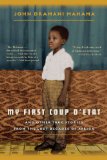Summary | Excerpt | Reading Guide | Reviews | Beyond the book | Read-Alikes | Genres & Themes | Author Bio

An Autobiography
by Paul RusesabaginaThe riveting life story of hotel manager Paul Rusesabagina who, as his country was being torn apart by violence during the Rwandan genocide of 1994, sheltered more than 12,000 members of the Tutsi clan and Hutu moderates, while homicidal mobs raged outside with machetes.
As his country was being torn apart by violence during the
Rwandan genocide of 1994, hotel manager Paul Rusesabagina—the
"Oskar Schindler of Africa"—refused to bow to the madness
that surrounded him. Confronting killers with a combination
of diplomacy, flattery, and deception, he offered shelter to
more than twelve thousand members of the Tutsi clan and Hutu
moderates, while homicidal mobs raged outside with machetes.
An Ordinary Man explores what the Academy
Award-nominated film Hotel Rwanda could
not: the inner life of the man who became one of the most
prominent public faces of that terrible conflict.
Rusesabagina tells for the first time the full story of his
life—growing up as the son of a rural farmer, the child of a
mixed marriage, his extraordinary career path which led him
to become the first Rwandan manager of the Belgian-owned
Hotel Milles Collines—all of which contributed to his heroic
actions in the face of such horror. He will also bring the
reader inside the hotel for those one hundred terrible days
depicted in the film, relating the anguish of those who
watched as their loved ones were hacked to pieces and the
betrayal that he felt as a result of the UN’s refusal to
help at this time of crisis.
Including never-before-reported details of the Rwandan
genocide, An Ordinary Man is sure to become
a classic of tolerance literature, joining such books as
Thomas Keneally’s Schindler’s List, Nelson
Mandela’s Long Walk to Freedom, and Elie
Wiesel’s Night. Paul Rusesabagina’s
autobiography is the story of one man who did not let fear
get the better of him—a man who found within himself.
Rusesabagina relates the full story of his life - growing up as the son of a rural farmer and the child of a mixed marriage (Hutu father, Tutsi mother), and how he became the first Rwandan manager of the Belgian-owned Hotel Milles Collines. He then takes the reader inside his hotel where he protected 1,268 people from almost certain death for three terrible months between April 6 and July 4 1994 during which time more than 800,000 Rwandans were killed...continued
Full Review
(312 words)
This review is available to non-members for a limited time. For full access,
become a member today.
(Reviewed by BookBrowse Review Team).
The Republic of Rwandais a landlocked country in East Central Africa bordering on Congo, Uganda, Tanzania and Burundi. It is one of the most densely populated countries in Africa; about 80% of its 8.5 million people are Hutu, most of the remainder are Tutsi, with a few Twa (pygmies). The majority religion is Christianity (75%), and French and English are the joint official languages. The economy is overwhelmingly agricultural with most engaged in subsistence farming.
The Twa are believed to have been the first to settle Rwanda, followed by the Hutu in about 1000 AD. The Tutsis migrated into the area around the 15th century and gained dominance over the Hutus. However, over the centuries there has been much intermarriage between the two main...
This "beyond the book" feature is available to non-members for a limited time. Join today for full access.

If you liked An Ordinary Man, try these:

by Elizabeth Weil, Clemantine Wamariya
Published 2019
A riveting story of dislocation, survival, and the power of stories to break or save us.

by John Mahama
Published 2013
My First Coup d'Etat chronicles the coming-of-age of John Dramani Mahama in Ghana during the dismal post-independence "lost decades" of Africa.
Education is the period during which you are being instructed by somebody you do not know, about something you do ...
Click Here to find out who said this, as well as discovering other famous literary quotes!